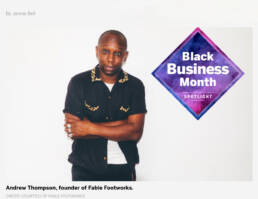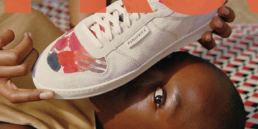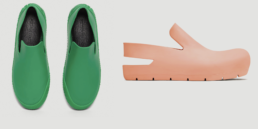
Footwear News Feature – Fable Footworks is Helping Brands Change With The Times
During his 20-plus years in footwear, Andrew Thompson has been the creative force behind several of the industry’s most storied brands. But when it comes to running his own London-based consultancy, Fable Footworks, he has grander aspirations beyond crafting great product.
“With the world changing at an unprecedented rate, culture, sociopolitics and environmental issues challenge normality globally,” he said. “I really feel it’s important to adapt products for our environment.”
A graduate of Central Saint Martins, Thompson has over the course of his career held design positions with Shellys London, River Island and Lloyd Shoe Co., where he produced footwear for Topman, Ben Sherman and Burton. He later moved to Kurt Geiger, where he rose to be head of men’s buying. And more recently, he served as design director at Clarks, in its global headquarters in Somerset, England.
“I loved everything about that job,” said Thompson, “but my family missed being in London, and you have to put their needs first.”
After returning to London last year, Thompson founded his Fable Footworks consultancy to guide businesses through this rapidly changing marketplace.
“I felt there was a gap in helping brands operate and create design solutions around three pillars: sustainability, social impact and commerciality,” he explained. “I approach every project from a broad aspect, not just from a footwear perspective, [asking] what are the narratives? Who are we trying to communicate with? How do ideas translate not only into product but also thinking about the digital landscape, brand positioning and [unique selling point]?”
He noted that his business emphasizes a collaborative process. “The unique thing about Fable Footworks is there is a lot of listening and translation to understand what clients need, but also presenting new ideas and new commodities before the status quo,” said Thompson.
That same openness to new perspectives will be a vital component in the industry’s efforts to evolve and diversify, said Thompson. “As a community, we need to keep pushing the idea of identity and call out misogyny, racism and transphobia in the industry,” he said.
In the wake of the recent social justice movement that’s been sweeping the globe, many fashion companies have issued statements condemning racism and hate. While Thompson cheers this new awakening, he challenges brands to back up their words with action. “How much meaningful commitment will be followed up by companies openly speaking out on equality, diversity, inclusion and antiracist practices?” he asked. “Change only happens when brands really back a cause shifting social impact.”
For his part, Thompson has been speaking up on issues via op-eds for the British Footwear Association and through his “Footwear Fable” podcast streaming on Soundcloud. And he’s been reaching out to inspire the younger generation through mentorship, by giving talks to students at Central Saint Martins.
However, he added, “It is hard for individuals to change the industry, so the onus really is with the brands. Should it be compulsory for them to share figures to show the diversity of the workforce? Yes. Should it be compulsory for transparency around the interview process? Yes. Also, best practices could be extended further and do away with fake diversity initiatives which aren’t effective.”
To young Black designers looking to start their own businesses, Thompson encourages them to enlist the help of others and take advantage of all the tools and technology available. “Be the change you would like to see: Rethink how business models can adapt, [how] new ideas [can be] implemented and how this will be achieved,” he said. “Always be unique and remain centered in creativity, innovation and design. Keep your eyes firmly on the prize and you will surely be fruitful.
“With the world changing at an unprecedented rate, culture, sociopolitics and environmental issues challenge normality globally,” he said. “I really feel it’s important to adapt products for our environment.”
— Andrew Thompson

Related Posts
10th April 2021
Spotlight Bottega Veneta’s footwear and communication
To fully recycle sneakers is very…



